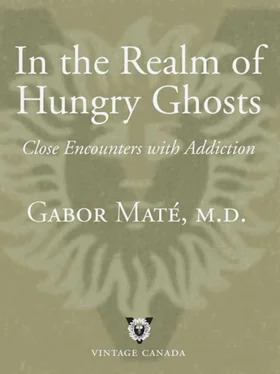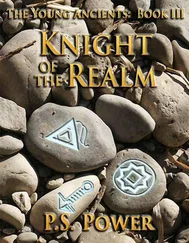Downtown Eastside addicts often ask for methadone carries for illicit purposes, such as selling the substance or injecting it to get a bigger rush. Others go to the pharmacy, but instead of swallowing their whole dose, they hold some in their mouth and later spit it into a coffee cup. The expectorated methadone then becomes merchandise. Despite the risk of transmittable disease, buyers don’t hesitate to drink a drug mixed with someone else’s saliva. Pharmacists are expected to observe complete ingestion of the methadone they dispense, but the rule is often broken, so juice is always up for sale on the streets.
“I have to verify this before I can give you the carry,” I replied to Serena. “Who’s your grandmother’s doctor?” Nonchalantly, she gave me the name. As she sat in my office and waited calmly, I dialled the physician’s office in Kelowna. “Mrs. B…,” my colleague said on the speaker phone. “Oh, no, it so happens she was very much alive when I saw her this morning.”
“You heard that,” I said to Serena. No flicker of movement, not the barest sign of embarrassment, registered on her face. “Well,” she shrugged, getting up to leave, “they told me she was dead.” I’ve often been struck by the childlike insouciance of my addicted patients when they lie to me. A naïve manipulation like the one Serena attempted is simply part of the game, and being caught is no more shameful than being found while playing hide-and-seek.
Her HIV care has been a source of struggle between us, since she habitually refuses to have her blood counts done. “I can’t know what treatment you need,” I explain, “if I don’t know the state of your immune system.” Once, in utter frustration, I tried to coerce her into having the blood tests by threatening to withhold her methadone. A week later I recanted. “It’s not my right to force you into anything,” I said by way of apology. “The methadone has nothing to do with HIV. Whether you get yourself tested or not is entirely up to you. I can only offer you my best advice. I’m sorry.” “Thank you, Maté,” Serena said. “I just don’t want anybody controlling me.” Soon afterwards she did undergo the required tests voluntarily. And so far her immune counts have been high enough that antiviral medications haven’t been needed.
The question of control is a touchy one. No segment of the population feels powerlessness more acutely than Downtown Eastside drug addicts. Even the average citizen finds it difficult to question medical authority, for a host of cultural and psychological reasons. As an authority figure, the doctor triggers deeply ingrained feelings of childhood powerlessness in many of us—I had that experience even years after completing medical training when I needed care for myself. But in the case of the drug addict, the disempowerment is real, palpable and quite in the present. Engaged in illegal activities to support her habit—her very habit being illegal—she is on all sides hemmed in by laws, rules and regulations. It occurs to me at times that, in the view of my addicted patients, the roles of detective, prosecutor and judge are grafted onto my duties as physician. I am there not only as a healer, but also as an enforcer.
Coming most commonly from a socially deprived background and having passed through courts and prisons repeatedly, the Downtown Eastside addict is unaccustomed to challenging authority directly. Dependent on the physician for her lifeline methadone prescription, she is in no position to assert herself. If she doesn’t like her doctor, she has little latitude to seek care elsewhere: downtown clinics are not eager to accept each other’s “problem” clients. Many addicts speak bitterly about medical personnel who, they find, impose their “my-way-or-the-highway” authority with arrogance and insensitivity. In any confrontation with authority, be it nurse, doctor, police officer or hospital security guard, the addict is virtually helpless. No one will accept her side of the story—or act on it even if they do.
Power comes with the territory and it corrupts. At the Portland I’ve caught myself in behaviours that I would never permit myself in any other context. Not long ago another young Native woman was in my office, also methadone dependent and also with HIV. I’ll call her Cindy. At the end of the visit I opened the door and called to Kim, the nurse whose office is directly next to mine: “Please draw blood for Cindy’s HIV indices, and we’ll need a urinalysis as well.” Several clients were sitting in chairs in the waiting area, and my words were clearly audible to all. Cindy, looking hurt, reproached me quietly. “You shouldn’t say that so loud.” I was aghast. Back in the “respectable” family practice I ran for twenty years before coming to work in the Downtown Eastside, it would have been unthinkable for me to commit such a callous breach of confidentiality, to injure someone’s dignity so brazenly. I closed the door and offered my regrets. “I was loud,” I agreed. “Very stupid of me.” “Yes, it was,” Cindy shot back, but somewhat mollified. I thanked her for being forthright. “I’m tired of everyone pushing me around,” she said as she stood up to leave.
There’s also a deeper source of the exaggerated power imbalance that besets doctor–patient relationships in the Downtown Eastside—not unique to this neighbourhood, but here it’s almost universal. Imprinted in the developing brain circuitry of the child subjected to abuse or neglect is fear and distrust of powerful people, especially of caregivers. In time this ingrained wariness is reinforced by negative experiences with authority figures such as teachers, foster parents and members of the legal system or the medical profession. Whenever I adopt a sharp tone with one of my clients or display indifference or attempt some well-meant coercion for her benefit, I unwittingly take on the features of the powerful ones who first wounded and frightened her decades ago. Whatever my intentions, I end up evoking pain and fear.
For all these reasons, and more, Serena’s instinct is to guard her inner world from me. Her asking for help today owes something to the trust established between us but even more to her present despair.
“Is there anything you can give me for depression?” she begins. “My grandmother in Kelowna died three months ago. I’ve been thinking of going away to be with her.”
“Killing yourself?”
“Not killing myself, just taking some pills so…”
“That’s killing yourself.”
“I don’t call it that. Just going to sleep…Not waking up again.” Serena looks crushed and disconsolate. This time the loss of her grandmother is real.
“Please tell me about her,” I say.
“She was sixty-five. She raised me, from when my mother delivered me and left the hospital right away. The social worker had to phone my grandmother and tell her that if she didn’t come and sign papers, I’d be put into a foster home.” Throughout the entire discussion that follows Serena’s voice is grief-stricken, choked and weepy. Her tears stop flowing only intermittently.
“Then she raised my daughter from a year old.” Serena has a child, now fourteen years old, born to her when she herself was fifteen. Serena’s mother, in her forties and also a patient of mine, was sixteen when she abandoned her newborn. She has a room with her boyfriend in the same Hastings hotel where Serena lives.
“Where’s your daughter now?”
“With my Aunt Gladys. I guess she’s doing all right. After my grandmother died, she started getting into speed and everything like that…
“She raised me; she raised my brother Caleb and my sister Devona—my first cousins, actually, but we grew up like brother and sisters.”
“What kind of a home did she give you?”
Читать дальше












